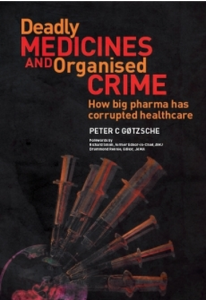Edited Dec 9th
Low and moderate use of anti-psychotics associated with lower mortality than no use at all: http://t.co/O0dexsFp7J
(HT @AllenFrancesMD)
— Huw (@Huwtube) December 5, 2014
Thanks 2 @Huwtube for link shows NOT antipsychotics lead to higher mortality in psychosis: shot the fox of anti meds http://t.co/4R62jdr10X
— Samei Huda (@SameiHuda) December 6, 2014
How did "low and moderate use" become "NOT antipsychotics lead to higher mortality in psychosis"? This interchange reminds me of the story by Hans Christian Andersen about how a feather became five hens:“There Is No Doubt About It!”
I didn't get beyond the paywall, but here is a quote from the abstract that I am setting up as a list:
High exposure (HR = 8.5, 7.3–9.8) and
no exposure (HR = 7.6, 5.8–9.9) were associated with higher cardiovascular mortality than either
low exposure (HR = 4.7, 3.7–6.0) or
moderate exposure (HR = 5.6, 4.8–6.6).
And I have some questions:
Did dr Huda shoot the fox by ignoring "high exposure"?
Who is "the fox of anti meds"?
In "Models of drug action", Joanna Moncrieff makes sense:
The drug-centred model focuses our attention on the impact that drugs have on the body and the brain, and on all the possible consequences that drug-induced alterations can have on how people think, feel and behave. It is a necessary starting point for the sensible, cautious and safe use of drugs in mental health services.YEAYYYY for "sensible, cautious and safe use of drugs"!
How did the people in the study who had no exposure to antipsychotics live?
Were they left to neglect themselves to death? Did they receive constructive treatment without drugs?
And ... what does the fox say?
The British Medical Association is not a fox nor a wooly-headed coven of deluded antiscientists, and here is something that it says, via The council for evidence-based psychiatry:
Peter Gøtzsche’s latest book ‘Deadly Medicines and Organised Crime: How Big Pharma has Corrupted Healthcare’ wins first prize in BMA book awards 2014
 Professor Peter Gøtzsche has won first prize in the 2014 BMA book awards in the Basis of Medicine Category with his most recent book, ‘Deadly Medicines and Organised Crime: How Big Pharma Has Corrupted Healthcare’, published by Radcliffe Publishing. Peter is Director of the Nordic Cochrane Centre and a member of CEP.
Professor Peter Gøtzsche has won first prize in the 2014 BMA book awards in the Basis of Medicine Category with his most recent book, ‘Deadly Medicines and Organised Crime: How Big Pharma Has Corrupted Healthcare’, published by Radcliffe Publishing. Peter is Director of the Nordic Cochrane Centre and a member of CEP.
The BMA reviewer commented as follows:
‘I would say that this book should be compulsory reading for medical students and junior doctors to make them aware of these issues…
The author’s long experience in the field leads to a clear and authoritative view on the failings of the pharmaceutical industry. However he is clear that doctors, their organisations, journals and policy makers also have a role in these failings. I was particularly interested in the entanglement between doctors and the pharmaceutical industry. The use of clear language – fraud, corruption, and criminality – helps show what we would call this behaviour in any other sphere of life. It also refocuses our minds on the impact this behaviour has on patients – medication being the third largest cause of death…
No comments:
Post a Comment
As the Vulcans say: "I rejoice in our differences". Comments, questions and differing opinions are welcome.
Because of spam, comments are now moderated.